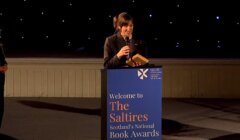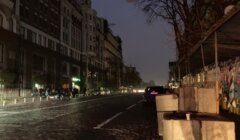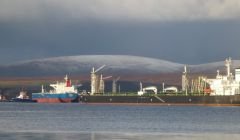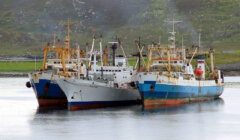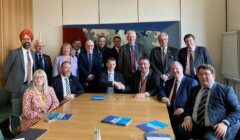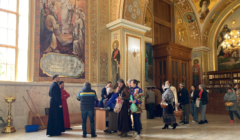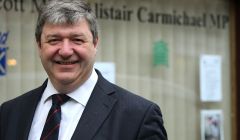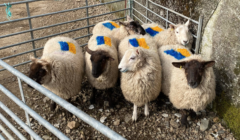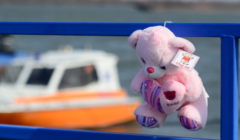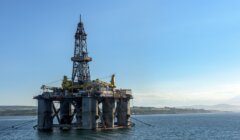Letters / A short history of Ukraine: a new Iron Curtain descending?
Ukraine is the third biggest country in Europe, slightly smaller, in land area, than France. Only Russia is bigger than both. It lies in Eastern Europe, sharing borders with Poland and Slovakia to the west, Belarus to the north, Russia to the north east, east and south east, Moldova and Romania to the south and Hungary to the south east and a long Black Sea coast to the south. Its population is over 44 million.
Ukraine, as we know it today, emerged in the latter part of the 20th century, following the collapse of Communism.
It was successively dominated, through history by Poland, Lithuania, Czechoslovakia, Hitler’s Germany, in WW2, USSR and Russia. It had a brief period of independence, following the end of WW1 but became, by force, a Soviet Socialist Republic soon after that. The capital, Kyev, stands on the Dnieper River, a major, north to south trading route, in Viking times and before that.
Ukraine suffered badly during WW2 from hostile neighbours; both Hitler’s Germany and Stalin’s Russia, suffering five million casualties during the extreme conflict. One million of the fatalities were Ukrainian Jews at the hands of the Nazis.
Some Ukrainians fought on the German side, in WW2, due to their fear of Russia, while the majority of fighters backed the Russian generals to help expel the Germans. The most famous Russian military leader was Marshal Georgy Zhukov who masterminded the German defeat.
Ukrainian fighters, again tried to expel occupying Russian troops into the early 1950s, placing an iron curtain over their Western neighbours. Sadly for Ukraine, after seven or eight years they were unsuccessful.
Recovery post 1945 was slow and difficult under Stalin’s Russia. Things started to improve, particularly during the Gorbachov era of Perestroika from 1985 to 1991. Greater levels of freedom allowed considerable economic development to proceed.
Become a member of Shetland News
Two thirds of the population speak Ukrainian, an eastern Slavonic language, with close links to Polish, while the remaining third, in the eastern part, speak Russian. A small number of the Russian speakers could be described as immigrants, but most eastern Ukrainian Russian speakers have been happy to be Ukrainians. Only a small minority of Russian speakers would voluntarily opt to join Russia. There are smaller numbers of nationals from neighbouring countries who also regard themselves as Ukrainians.
Ukraine is relatively poor country with one of the lowest GDPs in Europe, given its geography and proximity to Russia. It does, however, have some manufacturing industry, making tractors and agricultural machinery. More recently electronic and IT industries have become important.
Much of Ukraine consists of rich fertile agricultural land, and a warm summer climate, good for the growth of grain. The eastern part and the Black Sea area also has some industry which has lacked sufficient modern investment.
Chernobyl was another legacy of post war Communist Russia, with the resulting loss of life and large scale radioactive pollution.
Ukraine has been a multi party democracy since the early 1990s. Culturally and politically Ukraine is closer to Poland than other neighbouring countries, but they have good relationships with all their neighbours, including Russia, until 2014 and the past eight years.
Many younger people have studied at Polish universities over the past 30 or more years, while Germany has become a close ally too. Younger Ukrainians often work for German companies, particularly in the travel, tourism, service and educational industries.
The majority of today’s Ukrainians, look westwards to Europe and the European Union; indeed the government applied for EU membership only a few days ago following the 200,000 Russian troop invasion.
Countries such as Poland, Hungary, Czech Republic, Slovakia, Romania and Bulgaria have greatly benefitted from EU membership and the NATO protection shield.
Unfortunately for the majority of Ukrainians, in February and March of 2014 Russia coveted and annexed the Crimea along with its 2.5 million inhabitants. A small majority of people there are speaking Russian. Since then, many Ukrainians have had to leave Crimea.
Russia had for years coveted its port, former naval base and tourism facilities. The Russians then tried and failed to take over the important port of Mariupol in February and March 2014 marking a new short but sharp Russian–Ukrainian War.
In addition to Crimea, parts of Dombas and Luthansk in Eastern Ukraine were invaded in 2014. A low level war, sponsored by Russia, has continued ever since. Ukrainian troops have taken over 10,000 casualties while Russian casualties were probably similar in number. Many bordering houses, villages and towns have been destroyed.
Russia has now ramped up its 2014 low level war backed by last week’s invasion of 200,000 hostile Russian troops.
In 2014 Ukraine successfully repulsed further Russian incursions but now face a huge invasion force of a size not seen in Europe since 1945. For Europe, there is a danger of what appears to be a new Iron Curtain descending over parts of Eastern Europe.
Putin himself, as a former KGB leader is pretty scary, as are the recent actions of Russian troops. Most former Russian satellite countries in Eastern Europe have accepted membership of the EU and have sought the protective shield of NATO, provided by the West. The majority of Ukrainians may well like this prospect, and feel that the invasion makes this even more urgent.
Russians and Ukrainians have long regarded each other as brothers with large scale inter marriage occurring in both countries. A bit like Poland and Finland, in 1938 and 1939, Ukraine now finds itself being bullied by a big, powerful militarily neighbour, the Russian Bear.
Putin makes no secret of wishing to recreate an imperial Tsarist Russia or its dominant role in the old Communist USSR. As a dictator, he is seen as being unpredictable and thus dangerous. It is difficult to predict Putin’s mind or his next move.
Clearly the planned three-day rapid takeover of Ukraine has not happened in the past week. Russia is believed to have lost several thousands of fighting troops while Ukrainian forces have also suffered many casualties. More than 2,000 civilian Ukrainians, including women and children, have died.
Around 500,000 Ukrainians have fled to neighbouring Poland, while similar numbers are estimated to have gone to other western neighbours. These numbers increase, every day.
Meanwhile Russian gas supplies to Germany, Austria and Italy have in recent years been an important part of their energy requirements. Germany has halted the opening of the flow of Russian gas, via the new almost completed Nord Stream 2 pipeline from the Baltic. Gas and oil pipelines run through Ukraine. This is also very important to Russia. Putin’s Russia is now becoming increasingly isolated, worldwide as economic sanctions and cancellations of joint agreements with Western Countries collapse.
Western European and EU countries are finding themselves entering a more unstable and unpredictable period. Oil and gases prices have risen sharply to their highest levels in the past 10 years. Forty per cent of Europe’s gas and 25 per cent of its oil presently come from Russia.
Putin understands economic and military power but does not greatly care for any of the people caught in the middle, whether they be Russian or not.
Over the past 10 to 15 years, Russia is believed to have meddled in elections in USA, UK, other European countries along with the Brexit Referendum, in recent years. Many cyber-attacks have also originated in Russia.
There is considerable sympathy internationally for the sovereign independent country of Ukraine, during its present desperate predicament. European countries have hitherto declined to send troops into Ukraine, knowing this would amount to war but many countries have supplied some military hardware.
Attitudes in more neutral Sweden and Finland have hardened, due to increasing threats from Russia and they now consider joining NATO. Germany has exported armaments to Ukraine along with UK, USA, Canada and other EU countries.
Diplomacy has not been given a chance as Putin’s Russian troops began attacking Ukraine, by land, air and sea. The problem is that Putin may not be prepared to stop at Ukraine, if successful, leaving many worried people in Bulgaria, Hungary, Czech Republic, Slovakia, Poland and the Baltic countries.
With today’s 24-hour news cover, people across the world have seen Russian rockets targeting civilian multi storey flats in Kharkiv, an industrial city in north east Ukraine, 30 miles from the Russian borders with increasing horror. We have seen this type of desperate Russian behaviour in Syria too, particularly in the destruction of Syria’s second city Aleppo and indiscriminate carpet bombing and the loss of tens of thousands of innocent lives.
Chechnya and its capital city Grozny in the North Caucasus was bombed and destroyed. History in Europe tells us that dictators, such as Napoleon, Hitler or Putin are not particularly interested in the fate of their own people and armies, or the chaos, damage, destruction wreaked on the invaded countries.
Memories of Finland in 1938, a raft of Eastern European Countries after WW 2, Hungary 1956, Czechoslovakia 1968, remind us that while much has changed in the past 80 years, countries bordering Russia have good reason to fear it.
History often repeats itself. Dictators such as Hitler Stalin or Putin do not have to listen to the voters and politicians. Dictators are thus both dangerous and unpredictable.
It comes as a major shock to many in Western and Eastern European countries plus Turkey having to adapt rapidly to this new and more threatening reality on their doorsteps. They along with all NATO countries will need to remain vigilant in the months and years ahead.
The people of Ukraine would like to look after and govern themselves peacefully in the future, rather than be bombed and slaughtered into submission by Putin’s troops. They have learned a sharp lesson on the value of EU membership, international cooperation, human rights and defensive NATO protection.
The people of Ukraine now hold the moral high ground in the eyes of the rest of world. Maybe the Western world should have done more to prevent the tragic events of the past week, the annexing of Crimea and other unpalatable deeds against Ukraine in recent years.
We can only hope for some sort of a ceasefire and a halt to indiscriminate attacks on civilians, large scale slaughter and destruction. Who knows what sort of a future faces both the people of Ukraine and an isolated Russia?
John Mowat
Kirkwall
Become a member of Shetland News
Shetland News is asking its many readers to consider paying for membership to get additional features and services: -
- Remove non-local ads;
- Bookmark posts to read later;
- Exclusive curated weekly newsletter;
- Hide membership messages;
- Comments open for discussion.
If you appreciate what we do and feel strongly about impartial local journalism, then please become a member of Shetland News by either making a single payment, or setting up a monthly, quarterly or yearly subscription.












































